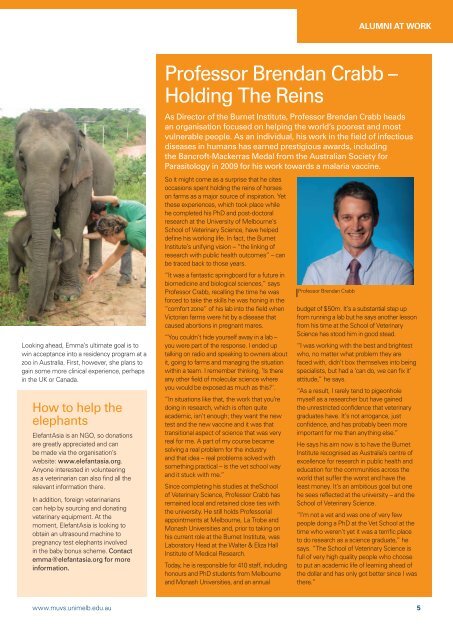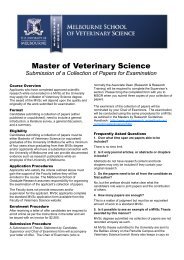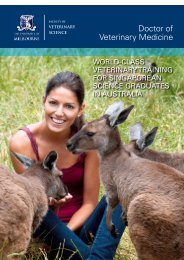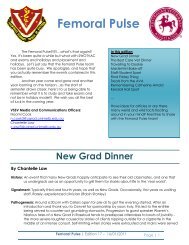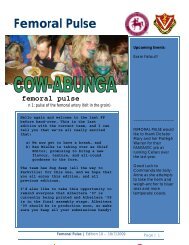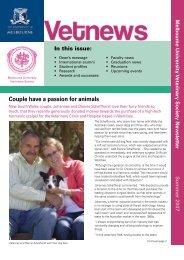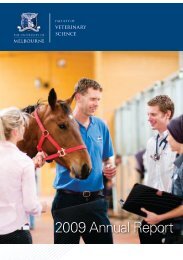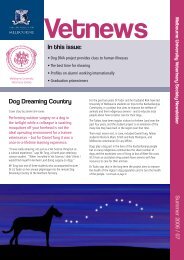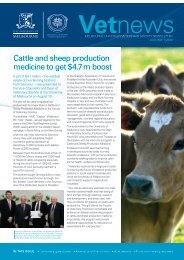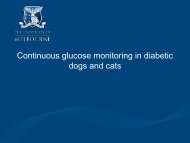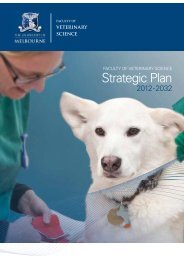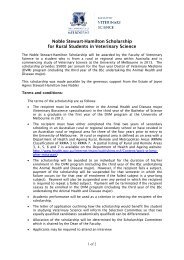Vetnews - Faculty of Veterinary Science - University of Melbourne
Vetnews - Faculty of Veterinary Science - University of Melbourne
Vetnews - Faculty of Veterinary Science - University of Melbourne
You also want an ePaper? Increase the reach of your titles
YUMPU automatically turns print PDFs into web optimized ePapers that Google loves.
ALUMNI AT WORK<br />
Looking ahead, Emma’s ultimate goal is to<br />
win acceptance into a residency program at a<br />
zoo in Australia. First, however, she plans to<br />
gain some more clinical experience, perhaps<br />
in the UK or Canada.<br />
How to help the<br />
elephants<br />
ElefantAsia is an NGO, so donations<br />
are greatly appreciated and can<br />
be made via the organisation’s<br />
website: www.elefantasia.org.<br />
Anyone interested in volunteering<br />
as a veterinarian can also find all the<br />
relevant information there.<br />
In addition, foreign veterinarians<br />
can help by sourcing and donating<br />
veterinary equipment. At the<br />
moment, ElefantAsia is looking to<br />
obtain an ultrasound machine to<br />
pregnancy test elephants involved<br />
in the baby bonus scheme. Contact<br />
emma@elefantasia.org for more<br />
information.<br />
Pr<strong>of</strong>essor Brendan Crabb –<br />
Holding The Reins<br />
As Director <strong>of</strong> the Burnet Institute, Pr<strong>of</strong>essor Brendan Crabb heads<br />
an organisation focused on helping the world’s poorest and most<br />
vulnerable people. As an individual, his work in the field <strong>of</strong> infectious<br />
diseases in humans has earned prestigious awards, including<br />
the Bancr<strong>of</strong>t-Mackerras Medal from the Australian Society for<br />
Parasitology in 2009 for his work towards a malaria vaccine.<br />
So it might come as a surprise that he cites<br />
occasions spent holding the reins <strong>of</strong> horses<br />
on farms as a major source <strong>of</strong> inspiration. Yet<br />
these experiences, which took place while<br />
he completed his PhD and post-doctoral<br />
research at the <strong>University</strong> <strong>of</strong> <strong>Melbourne</strong>’s<br />
School <strong>of</strong> <strong>Veterinary</strong> <strong>Science</strong>, have helped<br />
define his working life. In fact, the Burnet<br />
Institute’s unifying vision – “the linking <strong>of</strong><br />
research with public health outcomes” – can<br />
be traced back to those years.<br />
“It was a fantastic springboard for a future in<br />
biomedicine and biological sciences,” says<br />
Pr<strong>of</strong>essor Crabb, recalling the time he was<br />
forced to take the skills he was honing in the<br />
“comfort zone” <strong>of</strong> his lab into the field when<br />
Victorian farms were hit by a disease that<br />
caused abortions in pregnant mares.<br />
“You couldn’t hide yourself away in a lab –<br />
you were part <strong>of</strong> the response. I ended up<br />
talking on radio and speaking to owners about<br />
it, going to farms and managing the situation<br />
within a team. I remember thinking, ‘Is there<br />
any other field <strong>of</strong> molecular science where<br />
you would be exposed as much as this?’.<br />
“In situations like that, the work that you’re<br />
doing in research, which is <strong>of</strong>ten quite<br />
academic, isn’t enough; they want the new<br />
test and the new vaccine and it was that<br />
transitional aspect <strong>of</strong> science that was very<br />
real for me. A part <strong>of</strong> my course became<br />
solving a real problem for the industry<br />
and that idea – real problems solved with<br />
something practical – is the vet school way<br />
and it stuck with me.”<br />
Since completing his studies at theSchool<br />
<strong>of</strong> <strong>Veterinary</strong> <strong>Science</strong>, Pr<strong>of</strong>essor Crabb has<br />
remained local and retained close ties with<br />
the university. He still holds Pr<strong>of</strong>essorial<br />
appointments at <strong>Melbourne</strong>, La Trobe and<br />
Monash Universities and, prior to taking on<br />
his current role at the Burnet Institute, was<br />
Laboratory Head at the Walter & Eliza Hall<br />
Institute <strong>of</strong> Medical Research.<br />
Today, he is responsible for 410 staff, including<br />
honours and PhD students from <strong>Melbourne</strong><br />
and Monash Universities, and an annual<br />
Pr<strong>of</strong>essor Brendan Crabb<br />
budget <strong>of</strong> $50m. It’s a substantial step up<br />
from running a lab but he says another lesson<br />
from his time at the School <strong>of</strong> <strong>Veterinary</strong><br />
<strong>Science</strong> has stood him in good stead.<br />
“I was working with the best and brightest<br />
who, no matter what problem they are<br />
faced with, didn’t box themselves into being<br />
specialists, but had a ‘can do, we can fix it’<br />
attitude,” he says.<br />
“As a result, I rarely tend to pigeonhole<br />
myself as a researcher but have gained<br />
the unrestricted confidence that veterinary<br />
graduates have. It’s not arrogance, just<br />
confidence, and has probably been more<br />
important for me than anything else.”<br />
He says his aim now is to have the Burnet<br />
Institute recognised as Australia’s centre <strong>of</strong><br />
excellence for research in public health and<br />
education for the communities across the<br />
world that suffer the worst and have the<br />
least money. It’s an ambitious goal but one<br />
he sees reflected at the university – and the<br />
School <strong>of</strong> <strong>Veterinary</strong> <strong>Science</strong>.<br />
“I’m not a vet and was one <strong>of</strong> very few<br />
people doing a PhD at the Vet School at the<br />
time who weren’t yet it was a terrific place<br />
to do research as a science graduate,” he<br />
says. “The School <strong>of</strong> <strong>Veterinary</strong> <strong>Science</strong> is<br />
full <strong>of</strong> very high quality people who choose<br />
to put an academic life <strong>of</strong> learning ahead <strong>of</strong><br />
the dollar and has only got better since I was<br />
there.”<br />
Dr<br />
co<br />
a f<br />
Un<br />
at<br />
www.muvs.unimelb.edu.au 5


